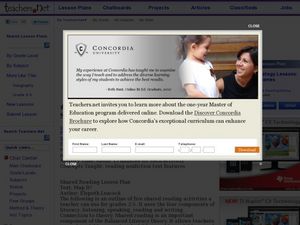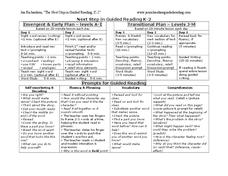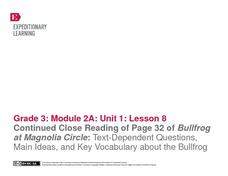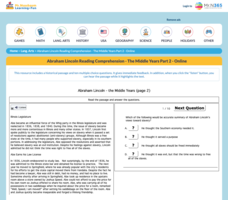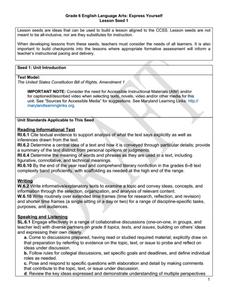Ontario
Sample Guided Reading Lesson for Emergent Readers
Give your guided reading lesson plan a boost with a sample lesson plan designed to reinforce academic content covered in previous assessments. The sample plan describes how the story and activities were chosen and offers the following...
Curated OER
Using Social Studies in Five Shared Reading Lessons: Geography
After several short 15-minute mini-lessons, your learners will gain an understanding of the characteristics of a non-fiction text. Using the book Map It by Elspeth Leacock, your class will become acquainted with non-fiction terms such as...
Wisconsin State Reading Association
Next Step in Guided Reading
Here are three guided reading lesson plan templates; each designed to meet the needs of a specific level of readers. Levels in focus are emergent, early, and transitional readers. Additionally, prompts to support your small group...
Fluence Learning
Writing About Informational Text: Music and the Brain
Even if you've never picked up a musical instrument, chances are that music has directly impacted your mental and emotional development. Sixth graders engage in a reading activity in which they read two articles on the impact of music on...
Frank Macias Elementary School
Preparing for Guided Reading
Take your guided reading lesson plans to the next level with a collection of printables, templates, and reference tools equipped to support the reading needs of your readers. Included is a detailed information page, grouping sheet,...
Curated OER
Fluency Passages, 3rd Grade
What would it be like to travel in a covered wagon? Learn about the life of a pioneer with a short informational reading passage. Kids read four paragraphs about traveling in a covered wagon and how it is different than traveling today,...
EngageNY
Mid-Unit Assessment: Close Reading of Bullfrog at Magnolia Circle: Bullfrog Life Cycle
The sixth lesson plan in this Bullfrog at Magnolia Circle unit assesses your third graders' ability to read and understand informational text. The included assessment asks learners to take notes about the main idea and supporting details...
EngageNY
End of Unit 2 Assessment: Working with Two Texts - Reading, Listening, Summarizing, and Synthesizing
As a summative assessment for this unit on colonial trade, fourth graders listen to and read informational texts in order to demonstrate their ability to take notes, write summaries, and draw connections. Young scholars first listen as...
EngageNY
Close Reading of Bullfrog at Magnolia Circle: Text-Dependent Questions, Main Ideas, and Key Vocabulary about the Bullfrog
As your 3rd grade class finishes reading Bullfrog at Magnolia Circle, the eighth lesson plan of this unit helps readers from an understanding of the very specific information on the final page of the book. As with the entire unit,...
EngageNY
Continued Close Reading of Bullfrog at Magnolia Circle: Text-Dependent Questions and Vivid Words and Phrases
As 3rd graders continue reading Bullfrog at Magnolia Circle, they focus on the concepts of predator and prey in the fifth lesson plan of this unit. Scholars further develop their ability to answer questions using evidence from the text...
EngageNY
Continued Close Reading of Bullfrog at Magnolia Circle: Text-Dependent Questions and Vivid Words and Phrases
In the third activity from this unit based on the book Bullfrog at Magnolia Circle, learners focus on using specific details from the text-to-answer questions about the habitat of bullfrogs. While reading the text, young scholars are...
Mr. Nussbaum
Abraham Lincoln Reading Comprehension—The Middle Years (Part 2)
Abraham Lincoln's face may only be worth one cent, but the online reading passage and questions about his life are an invaluable resource. Pupils read a passage about Lincoln's experience with the Illinois Legislature, earning his law...
Roald Dahl
Roald Dahl Matilda Lesson Plans
Fifty eye-catching pages contain six lessons about Roald Dahl's novel, Matilda. Each lesson has a theme and covers a different subject—literacy, social-emotional learning, science, and geography. Scholars analyze characters, examine...
Mr. Nussbaum
Abraham Lincoln Reading Comprehension—The Middle Years (Part 1)
Learn more about Honest Abe with an informative passage that details his life chronologically. As learners read sections of the text, they answer multiple choice questions that draw on their ability to recall details from the passage.
Curated OER
Express Yourself Lesson Seed 1
Make a study of the First Amendment and its relationship to freedom. Pupils rewrite the amendment and discuss the central idea before focusing on a specific phrase. After discussing, class members write a journal entry about the included...
Scholastic
Transitional Guided Reading
Use a fill-in-the-blank lesson plan template to enhance your guided reading lesson plans with details surrounding decoding strategies, fluency and phrasing, vocabulary strategies, comprehension, and more!
EngageNY
Grade 9 ELA Module 3, Unit 1, Lesson 5
Ninth graders study the study of animals in an informational text lesson plan that focuses on analyzing text structure. As learners continue reading the first chapter of Temple Grandin's Animals in Translation, they form inquiries and...
National Math + Science Initative
Reading an Informational Text: "It All Started with Sputnik"
Sputnik was one of the greatest scientific advancements of the 1950s, and this reading lesson does it justice. Pupils start off with pre-reading questions and a video. They then read an excerpt from an article, which is accompanied by...
Curated OER
World Religion Day: Reading Activities
If your class is observing World Religion Day in January, use this resource to provide a research and response opportunity. A short informational reading (available as an MP3 download for auditory learners and listening exercises) is the...
Curated OER
Jigsaw Reading Keeps Readers Accountable
Utilize the jigsaw reading strategy to keep pupils accountable and encourage cooperative learning.
Curated OER
Active Reading with American History
Explore connections within and between informational texts with this lesson about encyclopedia articles. Middle schoolers write encyclopedia articles focusing on topics in American history. They discuss how to determine credibility...
Curated OER
Information Shuffle
Gather some information, print it onto sentence strips, and then have your class physically shuffle the cards to better understand the importance of organizational patterns in writing. Middle school learners examine information for a...
Curated OER
Reading a Comparison-Contrast Essay
Turn your passive readers into active readers with an engaging lesson plan on reading informational text. Focused on compare and contrast structured essays, the activity prompts elementary learners to jot down questions and think-aloud...
Core Knowledge Foundation
The Human Body Tell It Again!™ Read-Aloud Anthology
A read-aloud anthology showcases various stories about the human body. Scholars participate in lessons that introduce a reading, listen to and discuss the reading, then complete in-class and at-home practice.



